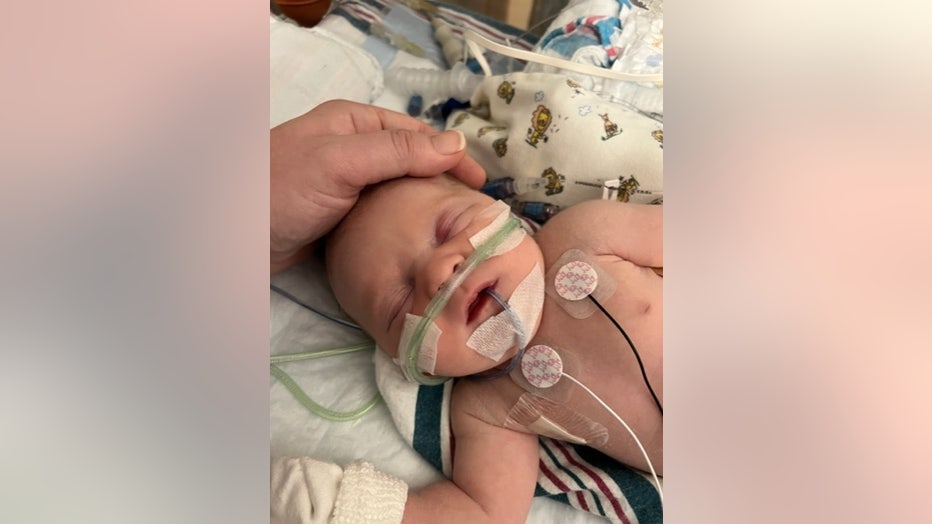Buford newborn first in Georgia to be placed on kidney dialysis machine designed for babies

NICU baby thrives after rough life start
At just a week old, Everly became the first baby at Children's Healthcare of Atlanta to be placed on a new dialysis machine designed for the tiniest patients.
ATLANTA - Outside Children's Healthcare of Atlanta at Egleston neonatal ICU, where Everly Deskins spent her first five weeks of life, her parents Ashley and Bryan Deskins update the nurses who took care of her on how the now 10-month-old is doing.
"Incredible," Ashley Deskins says, "You would not even know that she is a kidney baby."
Things were much different when Everly came into the world on March 8, 2023, five weeks early, Bryan Deskins was struck by how tiny she was.
Doctors had been monitoring Everly in the womb for months, amid signs her kidneys were not developing normally.
Newborn rushed to hospital with life-threatening kidney issue
Now, the Deskins learned her kidneys were fused, and Everly had only about 20% of normal kidney function.
"It was so hard," her mother says. "There was so many wires and stickers, and we couldn't hold her. She was really swollen. Her coloring was very off. She bruised very, very easily."
When she was hours old, Everly was transferred by ambulance to Children's Healthcare at Egleston.
"It was one person after another, after another, just hands on our girl," Bryan Deskins says. "But they had a plan."
Dr. Stella Shin, the medical director of acute dialysis at Children's, and her team knew Everly's needed around-the-clock kidney dialysis.
"There were a lot of waste products building up in her body that her kidneys could not get rid of, and there were dangerous levels of electrolytes accumulating in her body as well," Dr. Shin says.
What is CARPEDIEM?
Still, there was a major challenge: Everly's size.
Everly weighed just six pounds, and the machine used for continuous dialysis were designed for adults, not NICU babies.
But at Dr. Shin's request, months earlier, Children's had purchased CARPEDIEM, the first FDA-approved continuous dialysis machine engineered specifically for babies and small children.
"Everything about the machine has basically been miniaturized for small patients," Shin says. "It's specially designed to, um, handle the smaller body size and the smaller, smaller blood vessels. It's just much safer for these very sick children who need dialysis."
When Everyl was 7 days old, the team approached the Deskins about placing their baby on the machine.
"They came to us and said, 'We have this option: this is how it works, this is what we're doing, and this is why we're doing it,'" Bryan Deskins says.
With the Deskins' permission, it took a team of specialists to place Everly, now down to just four pounds, on the machine.
"It was daunting at first, right," her father says. "Seeing your child hooked up to a machine three times their size. But it was, I would say, within hours you could just, her color was different. Things were different."
Ashley and Everly's big sister, Averie, as the machine took over for her kidneys.

Everly Deskins shortly after her birth in March 2023. (Deskins family photo)
The swelling began to drop.
"Came back the next day and looked at her, and she didn't even look like the same baby," Ashley Deskins says. "She was just this tiny little baby there with this tiny little face that I had never seen."
The Deskins were told Everly might need two weeks on the machine.
Instead, her kidney function normalized in just three days.
Infant recovering after kidney near-failure
Several months later, when her kidneys started to fail again, she began home dialysis.
'At this point, we're really just waiting for her to grow big enough to get a kidney transplant, which is about 22 pounds," Dr. Shin says.
That is still months away.
Until then, the Deskins say Everly is doing fine.
"She's pink coloring, big puffy cheeks, big blue eyes," her mother says.
"She smiles all the time," Bryan Deskins says. "If you just look at her, you never know. And that's just such a blessing for us."
"She's just beautiful, beautiful, and she's just thriving," her mother says.

